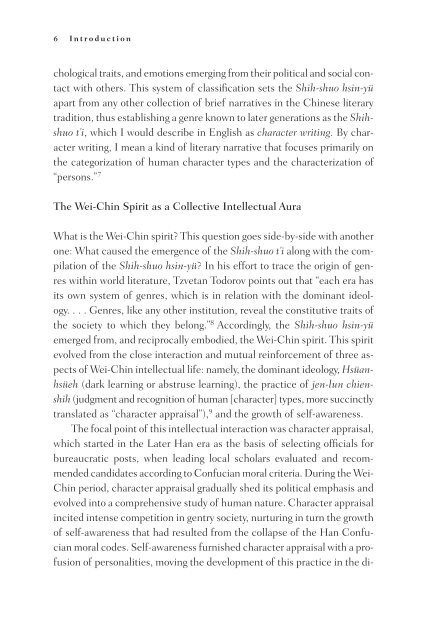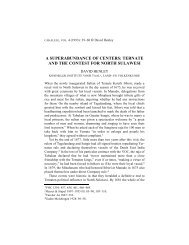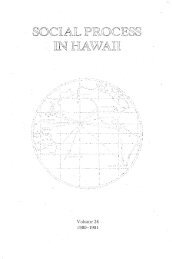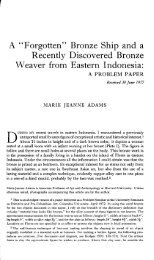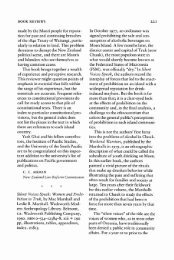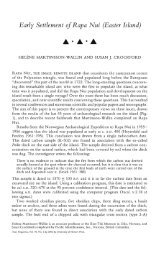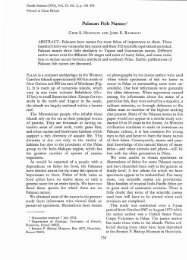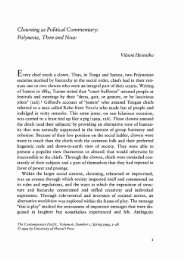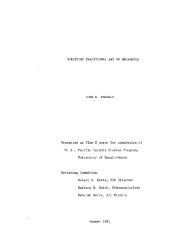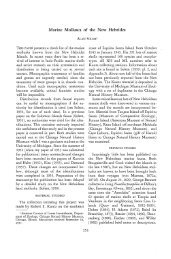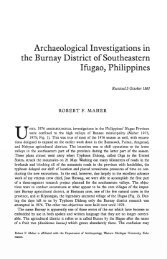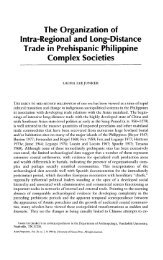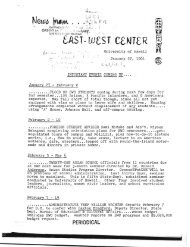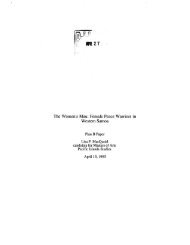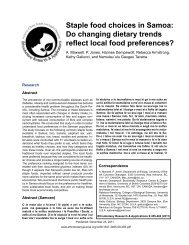- Page 2 and 3: ∫ SPIRIT AND SELF IN MEDIEVAL CHI
- Page 4 and 5: ∫ SPIRIT AND SELF IN MEDIEVAL CHI
- Page 6: To Richard B. Mather
- Page 9 and 10: viii Contents Chapter 8. Milk and S
- Page 12 and 13: ∫ Acknowledgments Growing up in N
- Page 14 and 15: ∫ Chinese Dynasties Shang ca. 16t
- Page 16: ∫ Japanese Periods Involved in th
- Page 19 and 20: 2 Introduction The Purpose and Sign
- Page 21: 4 Introduction What immediately str
- Page 25 and 26: 8 Introduction character appraisal
- Page 27 and 28: 10 Introduction human relationships
- Page 29 and 30: 12 Introduction ically, it means
- Page 31 and 32: 14 Introduction her in relation to
- Page 34 and 35: ∫ Introduction to Part 1: Shih-sh
- Page 36 and 37: Shih-shuo t’i, the Term and the G
- Page 38 and 39: Character Appraisal 21 a dark, secr
- Page 40 and 41: Character Appraisal 23 porary with
- Page 42 and 43: Character Appraisal 25 discursive p
- Page 44 and 45: Character Appraisal 27 havior.” 2
- Page 46 and 47: verge, and doing and not-doing go i
- Page 48 and 49: Character Appraisal 31 rapidly evol
- Page 50 and 51: Character Appraisal 33 of the Chien
- Page 52 and 53: Character Appraisal 35 writing styl
- Page 54 and 55: Character Appraisal 37 cial, and in
- Page 56 and 57: old friends.” 60 While the Chin Y
- Page 58 and 59: Character Appraisal 41 the crowd”
- Page 60 and 61: Chapter ∫ 2 Character Appraisal a
- Page 62 and 63: Formation of Wei-Chin Spirit 45 P
- Page 64 and 65: Formation of Wei-Chin Spirit 47 Sun
- Page 66 and 67: Formation of Wei-Chin Spirit 49 Fig
- Page 68 and 69: Formation of Wei-Chin Spirit 51 Fig
- Page 70 and 71: Formation of Wei-Chin Spirit 53 fri
- Page 72 and 73:
Formation of Wei-Chin Spirit 55 par
- Page 74 and 75:
Formation of Wei-Chin Spirit 57 Lau
- Page 76 and 77:
Formation of Wei-Chin Spirit 59 low
- Page 78 and 79:
Formation of Wei-Chin Spirit 61 Fig
- Page 80 and 81:
ity cannot be equated with Huang Hs
- Page 82 and 83:
Period Complementary Opposites Majo
- Page 84 and 85:
Formation of Wei-Chin Spirit 67 rep
- Page 86 and 87:
Formation of Wei-Chin Spirit 69 li
- Page 88 and 89:
Formation of Wei-Chin Spirit 71 (bo
- Page 90 and 91:
Formation of Wei-Chin Spirit 73 con
- Page 92 and 93:
Formation of Wei-Chin Spirit 75 the
- Page 94 and 95:
Formation of Wei-Chin Spirit 77 The
- Page 96 and 97:
Formation of Wei-Chin Spirit 79 it
- Page 98 and 99:
Formation of Wei-Chin Spirit 81 Som
- Page 100 and 101:
Formation of Wei-Chin Spirit 83 Vil
- Page 102 and 103:
Shih-shuo t’i 85 ing of the Shih-
- Page 104 and 105:
Figure 3.2. Sung edition of the Shi
- Page 106 and 107:
Shih-shuo t’i 89 anecdotes and pa
- Page 108 and 109:
Shih-shuo t’i 91 Pan Ku borrows C
- Page 110 and 111:
Shih-shuo t’i 93 ing “mistakes
- Page 112 and 113:
Shih-shuo t’i 95 heard along the
- Page 114:
hsiao-shuo (i.e., “fiction”). T
- Page 118 and 119:
∫ Introduction to Part 2: Fiction
- Page 120 and 121:
Chapter ∫ 4 Between Order and Dis
- Page 122 and 123:
Between Order and Disorder 105 to p
- Page 124 and 125:
‘nature’, and a Chinese thinker
- Page 126 and 127:
cheng-ming (rectification of names)
- Page 128 and 129:
Between Order and Disorder 111 is l
- Page 130 and 131:
Between Order and Disorder 113 nami
- Page 132 and 133:
Between Order and Disorder 115 port
- Page 134 and 135:
later generations.” He therefore
- Page 136 and 137:
Between Order and Disorder 119 may
- Page 138 and 139:
Between Order and Disorder 121 man
- Page 140 and 141:
Between Order and Disorder 123 Yang
- Page 142 and 143:
4. “Wen-hsüeh” (Literature and
- Page 144 and 145:
Between Order and Disorder 127 “p
- Page 146 and 147:
Between Order and Disorder 129 calm
- Page 148 and 149:
Between Order and Disorder 131 edly
- Page 150 and 151:
Between Order and Disorder 133 9. P
- Page 152 and 153:
Between Order and Disorder 135 32.
- Page 154 and 155:
the thing to make every man natural
- Page 156 and 157:
Between Order and Disorder 139 inal
- Page 158 and 159:
Between Order and Disorder 141 a wi
- Page 160 and 161:
Between Order and Disorder 143 dida
- Page 162 and 163:
Between Order and Disorder 145 omy:
- Page 164 and 165:
Between Order and Disorder 147 She
- Page 166 and 167:
Between Order and Disorder 149 unco
- Page 168 and 169:
Chapter ∫ 5 Using Body to Depict
- Page 170 and 171:
Using Body to Depict Spirit 153 Wan
- Page 172 and 173:
one’s shen appears in the beholde
- Page 174 and 175:
Using Body to Depict Spirit 157 Liu
- Page 176 and 177:
Using Body to Depict Spirit 159 ext
- Page 178 and 179:
people extracts the spirit from the
- Page 180 and 181:
Using Body to Depict Spirit 163 cau
- Page 182 and 183:
Using Body to Depict Spirit 165 exp
- Page 184 and 185:
Using Body to Depict Spirit 167 ten
- Page 186 and 187:
Using Body to Depict Spirit 169 and
- Page 188 and 189:
Using Body to Depict Spirit 171 der
- Page 190 and 191:
Using Body to Depict Spirit 173 The
- Page 192 and 193:
Using Body to Depict Spirit 175 dyn
- Page 194 and 195:
Using Body to Depict Spirit 177 As
- Page 196 and 197:
Using Body to Depict Spirit 179 kne
- Page 198 and 199:
Using Body to Depict Spirit 181 (14
- Page 200 and 201:
K’un’s aloofness from the munda
- Page 202 and 203:
Using Body to Depict Spirit 185 whe
- Page 204 and 205:
Using Body to Depict Spirit 187 Per
- Page 206 and 207:
Using Body to Depict Spirit 189 pre
- Page 208:
∫ Part 3 Discontinuity along the
- Page 211 and 212:
194 Introduction to Part 3 table 5.
- Page 213 and 214:
196 Introduction to Part 3 imitatio
- Page 215 and 216:
198 Introduction to Part 3 dated 16
- Page 217 and 218:
200 Introduction to Part 3 lization
- Page 219 and 220:
table 6. periods covered in the shi
- Page 221 and 222:
204 Introduction to Part 3 shuo imi
- Page 223 and 224:
206 Introduction to Part 3 the only
- Page 225 and 226:
208 Introduction to Part 3 1708), a
- Page 227 and 228:
210 Introduction to Part 3 In short
- Page 229 and 230:
212 Part 3 subject, and to expel he
- Page 231 and 232:
214 Part 3 new categories have stro
- Page 233 and 234:
216 Part 3 emperor and Empress Chan
- Page 235 and 236:
218 Part 3 cerned about their own d
- Page 237 and 238:
220 Part 3 gentlemen to “flaunt t
- Page 239 and 240:
222 Part 3 both the state and milit
- Page 241 and 242:
224 Part 3 served her from various
- Page 243 and 244:
226 Part 3 table 7. the frequency o
- Page 245 and 246:
228 Part 3 based on candidates’ l
- Page 247 and 248:
230 Part 3 litical elements, then,
- Page 249 and 250:
232 Part 3 effective in achieving t
- Page 251 and 252:
234 Part 3 K’ung’s Continuation
- Page 253 and 254:
236 Part 3 using hsin—one of the
- Page 255 and 256:
238 Part 3 and was especially well
- Page 257 and 258:
240 Part 3 one’s heart and there
- Page 259 and 260:
242 Part 3 it as what “the myriad
- Page 261 and 262:
244 Part 3 In the T’ang Forest, W
- Page 263 and 264:
246 Part 3 first episode. And, in t
- Page 265 and 266:
dates and native places of ming-ch
- Page 267 and 268:
250 Part 3 sumers, and connoisseurs
- Page 269 and 270:
252 Part 3 writing a literary piece
- Page 271 and 272:
254 Part 3 of the] body it is best
- Page 273 and 274:
256 Part 3 likely explanation is th
- Page 275 and 276:
258 Part 3 obtain this job. But it
- Page 277 and 278:
260 Part 3 position presents this m
- Page 279 and 280:
262 Part 3 This sort of free-spirit
- Page 281 and 282:
264 Part 3 I’ve just come back fr
- Page 283 and 284:
266 Part 3 collections and beautifu
- Page 285 and 286:
268 Part 3 The “Pure Mystery Pavi
- Page 287 and 288:
270 Part 3 of silk-veined paper, an
- Page 289 and 290:
272 Part 3 beginning of the Ming Sh
- Page 291 and 292:
274 Part 3 hai-shih’ [RakJasas an
- Page 293 and 294:
276 Part 3 1620] and Ch’ung-chen
- Page 295 and 296:
278 Part 3 Li Chih. He suggested, t
- Page 297 and 298:
280 Part 3 ing a number of early Ch
- Page 299 and 300:
282 Part 3 2/88). Similarly, Hsü C
- Page 301 and 302:
284 Part 3 Figure 8.1. Li Ch’ing
- Page 303 and 304:
286 Part 3 Hsüan-hsüeh incorporat
- Page 305 and 306:
288 Part 3 Ch’ing attained his ch
- Page 307 and 308:
290 Part 3 i” (Chastity and right
- Page 309 and 310:
292 Part 3 saying: “Sister-in-law
- Page 311 and 312:
294 Part 3 in many others, a tensio
- Page 313 and 314:
296 Part 3 self. Notice how the fol
- Page 315 and 316:
298 Part 3 Although milk value and
- Page 317 and 318:
300 Part 3 ter he has grown up, he
- Page 319 and 320:
302 Part 3 paintings indicates poss
- Page 321 and 322:
304 Part 3 not with real plum trees
- Page 323 and 324:
306 Part 3 uments and was quite fru
- Page 325 and 326:
308 Part 3 male poetics. Indeed, th
- Page 327 and 328:
310 Part 3 Her purity of bamboo gro
- Page 329 and 330:
312 Part 3 Neither was therefore ca
- Page 331 and 332:
314 Part 3 spite of men’s depreci
- Page 333 and 334:
316 Part 3 she did not often compos
- Page 335 and 336:
318 Part 3 Woman Pai of Suchow was
- Page 337 and 338:
320 Part 3 ch’uan’s time, he wa
- Page 339 and 340:
322 Part 3 fucianism than did the C
- Page 341 and 342:
324 Part 3 als, although it extends
- Page 343 and 344:
326 Part 3 in art, music, and liter
- Page 345 and 346:
328 Part 3 episode, the association
- Page 347 and 348:
330 Part 3 public affairs, there wa
- Page 349 and 350:
332 Part 3 Wouldn’t I leave my co
- Page 351 and 352:
334 Part 3 are fragments of wall pa
- Page 353 and 354:
Figure 9.1. Hattori Nankaku’s (16
- Page 355 and 356:
338 Part 3 the Shoku yotsugi record
- Page 357 and 358:
340 Part 3 and fall of the previous
- Page 359 and 360:
342 Part 3 of his New Shih-shuo acc
- Page 361 and 362:
344 Part 3 Recently [1915], gentlem
- Page 363 and 364:
346 Part 3 first time in Ch’ing h
- Page 365 and 366:
348 Part 3 read: ‘Twenty years li
- Page 367 and 368:
350 Part 3 his standards of judgmen
- Page 369 and 370:
352 Part 3 The “plum painting”
- Page 371 and 372:
354 Part 3 Chiao-jen, and others, o
- Page 373 and 374:
356 Part 3 sighed with admiration f
- Page 375 and 376:
358 Part 3 His interpretation of ko
- Page 377 and 378:
360 Part 3 escape their fatal desti
- Page 379 and 380:
362 Part 3 Chiao-jen gave a speech
- Page 381 and 382:
364 Part 3 official name for primar
- Page 383 and 384:
366 Part 3 repression, it linked th
- Page 385 and 386:
Conclusion: The ∫ Self and the Mi
- Page 387 and 388:
370 Conclusion fall of states, and
- Page 389 and 390:
372 Conclusion shuo hsin-yü’s ta
- Page 391 and 392:
374 Conclusion the ancient can be m
- Page 393 and 394:
376 Conclusion diately involved the
- Page 395 and 396:
378 Conclusion ing the growth of th
- Page 397 and 398:
380 Conclusion Yin Hao’s refusal
- Page 399 and 400:
382 Notes to Pages 3-7 3. The citat
- Page 401 and 402:
384 Notes to Pages 13-18 23. Gordon
- Page 403 and 404:
386 Notes to Pages 21-25 [New York:
- Page 405 and 406:
388 Notes to Pages 29-32 ch’ing-i
- Page 407 and 408:
390 Notes to Pages 33-39 46. Ts’a
- Page 409 and 410:
392 Notes to Pages 48-53 p’in [Gr
- Page 411 and 412:
394 Notes to Pages 56-58 he have sp
- Page 413 and 414:
396 Notes to Pages 62-69 ing from t
- Page 415 and 416:
398 Notes to Pages 72-76 79. T’an
- Page 417 and 418:
400 Notes to Pages 79-80 spirit int
- Page 419 and 420:
402 Notes to Pages 84-85 Chapter 3:
- Page 421 and 422:
404 Notes to Pages 90-94 Hu Yinglin
- Page 423 and 424:
406 Notes to Pages 97-103 shuo] (Pe
- Page 425 and 426:
408 Notes to Pages 107-109 nese Phi
- Page 427 and 428:
410 Notes to Pages 114-118 And Yu-h
- Page 429 and 430:
412 Notes to Pages 124-129 major Hs
- Page 431 and 432:
414 Notes to Pages 139-143 92. Ibid
- Page 433 and 434:
416 Notes to Pages 148-153 widow],
- Page 435 and 436:
418 Notes to Pages 161-169 21. In t
- Page 437 and 438:
420 Notes to Pages 176-184 41. Shih
- Page 439 and 440:
422 Notes to Pages 200-207 is . . .
- Page 441 and 442:
424 Notes to Pages 218-223 9. See t
- Page 443 and 444:
426 Notes to Pages 226-229 gument,
- Page 445 and 446:
428 Notes to Pages 233-237 58. Chou
- Page 447 and 448:
430 Notes to Pages 240-242 p’i-p
- Page 449 and 450:
432 Notes to Pages 243-245 350, 361
- Page 451 and 452:
434 Notes to Pages 251-254 9. Ibid.
- Page 453 and 454:
436 Notes to Pages 257-261 34. P’
- Page 455 and 456:
438 Notes to Pages 267-273 74. Ho-s
- Page 457 and 458:
440 Notes to Pages 277-282 104. Kai
- Page 459 and 460:
442 Notes to Pages 288-289 neither
- Page 461 and 462:
444 Notes to Pages 293-297 followin
- Page 463 and 464:
446 Notes to Pages 300-303 48. Ibid
- Page 465 and 466:
448 Notes to Pages 306-311 69. Meng
- Page 467 and 468:
450 Notes to Pages 314-319 camel at
- Page 469 and 470:
452 Notes to Pages 325-327 era, in
- Page 471 and 472:
454 Notes to Pages 337-343 either a
- Page 473 and 474:
456 Notes to Pages 352-360 38. Ibid
- Page 475 and 476:
458 Notes to Pages 368-376 4. See,
- Page 477 and 478:
460 Glossary ai-yüan ch’i sao-je
- Page 479 and 480:
462 Glossary Chu Fa-t’ai «kO Chu
- Page 481 and 482:
464 Glossary hsing ? hsing-chih “
- Page 483 and 484:
466 Glossary k’ung-men yu ≈˘Õ
- Page 485 and 486:
468 Glossary Pen-wu ªL Pen-wui ªL
- Page 487 and 488:
470 Glossary T’ang-Wu ko-ming ˆZ
- Page 489 and 490:
472 Glossary Wen-fu · “Wen-hs
- Page 492 and 493:
∫ Selected Bibliography Sections
- Page 494 and 495:
Shih-shuo hsin-yü [chien-shu] @°s
- Page 496 and 497:
Selected Bibliography 479 Chiang Fa
- Page 498 and 499:
Selected Bibliography 481 Ma Hsing-
- Page 500 and 501:
Selected Bibliography 483 Toyofuku
- Page 502 and 503:
Selected Bibliography 485 Ïs (Coll
- Page 504 and 505:
Selected Bibliography 487 De Bary,
- Page 506 and 507:
Selected Bibliography 489 ———
- Page 508 and 509:
Selected Bibliography 491 Ko Hung
- Page 510 and 511:
Selected Bibliography 493 ———
- Page 512 and 513:
Selected Bibliography 495 Mao Shih
- Page 514 and 515:
Selected Bibliography 497 Spence, J
- Page 516 and 517:
Selected Bibliography 499 Wang Ch
- Page 518 and 519:
§Í•p°—ÿ (Bibliography of
- Page 520 and 521:
Selected Bibliography 503 [hsin-yü
- Page 522 and 523:
Akazome, Lady, 325 allegories: asce
- Page 524 and 525:
Chin Sheng-t’an, 359-360 Chin Shi
- Page 526 and 527:
Fujiwara no Michinaga, 452n. 22 Fuj
- Page 528 and 529:
162, 165, 177-178, 186, 362-363; ri
- Page 530 and 531:
389n. 42, 396nn. 54-57, 398nn. 86-8
- Page 532 and 533:
Shih-shuo allusions. 431n.98 Shih-s
- Page 534 and 535:
Tai K’uei, 52, 187-188 Taiping Re
- Page 536 and 537:
of, 59; co-product of men and women


